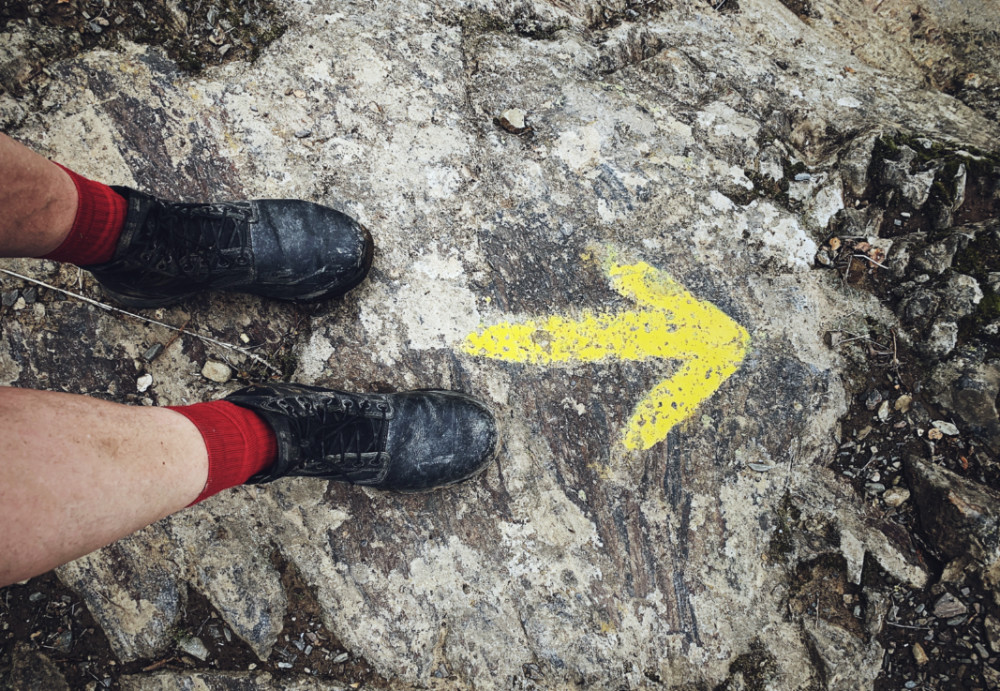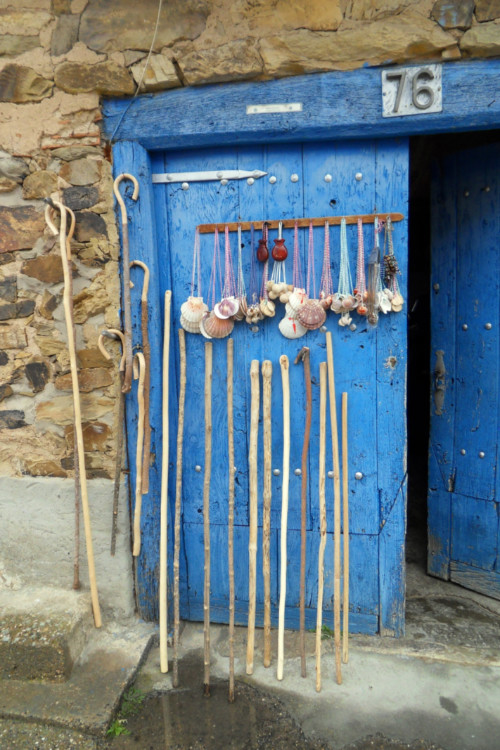
WES GRANBERG-MICHAELSON, former general secretary of the Reformed Church in America and author of ‘Without Oars: Casting Off Into a Life of Pilgrimage’ reflects on the idea of pilgrimage as we enter a new year…
Via RNS
The disruption of our normal routines wrought by COVID-19 means this new year was celebrated more with quiet and reflection, rather than with crowded parties. It can bring the gift of opening an inner space where we can entertain pressing questions about our destination.
The coming of a New Year reminds us that time moves us on, even as we shelter in place. Like pilgrims, we are carried along on a journey we share in more than we break a trail of our own. As we welcome 2021, we can ask what we should leave behind as we step ahead.

PICTURE: Jon Tyson/Unsplash/Creative Commons
When I was on the Camino de Santiago in northern Spain, a 1,000-year-old pilgrimage normally traversed by over 250,000 pilgrims each year, I noticed what these travellers left behind along the way. At pilgrim hostels and near shrines and chapels, I saw discarded shoes, shirts, guidebooks, towels, soap, socks and a flashlight – all deemed not essential and taken out of a backpack to lighten one’s load. We can do the same as we head into 2021 by asking ourselves a few questions.
Why am I who I am, where I am?
Life’s normal preoccupations and routines keep us on a treadmill, cluttering our minds. A constant avalanche of information cascades through our screens, absorbing our thoughts and crowding our memory. We need some detachment. Soren Kierkegaard once wrote, “It is good once in a while to feel oneself in the hands of God, and not always eternally slinking around the familiar nooks and crannies of a town where one always knows the way out.”

Walking staffs used by pilgrims. PICTURE: Barbara Bumm/Pixabay/Creative Commons
“Pilgrims, by stepping away from the confines of normalcy, clear their minds and center their souls. Contemplative prayer can be a way to step out of ourselves even in a pandemic that keeps us at home. Just as a pilgrimage takes us away from the comfortable surroundings of place, prayer seeks to discover a clarifying purpose in our life’s direction.”
Pilgrims, by stepping away from the confines of normalcy, clear their minds and center their souls. Contemplative prayer can be a way to step out of ourselves even in a pandemic that keeps us at home. Just as a pilgrimage takes us away from the comfortable surroundings of place, prayer seeks to discover a clarifying purpose in our life’s direction.
Whose life am I living?
We all learn how to construct our lives within a “container” of external expectations that allow the ego to grow and find a measure of security. For some, our successes and accomplishments are grafted into our identity. We are what we have done and can achieve. The praise and approval of others, supported by social and religious definitions of success, are absorbed by our thirsty souls.
Yet, that thirst is never really quenched. Lives can become ruled by the incessant quest for external affirmation. Expectations of others imprison us, defining and dominating how we live. That’s when we can ask, whose life are we really living, and seek the courage to discover our true self.
Christian writers as diverse as Richard Rohr, author of Falling Upward: A Spirituality for the Two Halves of Life, and Bob Buford, who wrote Halftime: Moving from Success to Significance, describe the journey of walking into the second half of life. The secure shell of external expectations and accomplishments is left behind. Life’s pilgrimage becomes framed by the spiritual discovery of who one is, rather than by what one does.
What have been my paths of privilege?
This year of racial reckoning has intensified the examination of our nation’s history of white supremacy. Like many other white pastors and denominational bureaucrats, I’ve taken part in various programs of anti-racism training. But at least for me, something different and deeper happened this past year.
The Psalmist declares, “The boundary lines have fallen for me in pleasant places.” For my pilgrimage, that’s certainly true: Much has been possible, and even easy, because I’m a white man. With many others, I’m walking into 2021 asking how to leave behind an innate sense of entitlement, and a quiet assumption that I should be in charge.
For long my default belief has been that I, and others like me, in the end will come up with the best answers. That’s what I need to take out of my pack to walk ahead freely.
When has my life become more than I could plan for?
We assume we’re in control of our lives, and if we have sufficient power, that’s often true. Yet, we all encounter circumstances that catapult us out of our control. Those can be devastating, but also promising, opening us up to the discovery of unpredictable grace. That is how transformation usually occurs.
Pilgrimage is a school of relinquishment. We walk forward into unknown terrain, not certain of what we will encounter, but learning to trust that hospitable grace will sustain us in unexpected ways.
The same should be true for churches and organisations. As a former chief executive of a Protestant denomination, and member of several boards of religious nonprofits, I have endured endless processes of strategic planning. They have a role, but I’ve become a sceptic. Neither of the two events that impacted us all this year, the racial reckoning following George Floyd’s murder and the coronavirus pandemic, could be predicted or planned for.
Walking into 2021, we are more in need of spiritual preparation that builds resilience, hope, and courage, rather than efficient planning. In this time between two presidents and between a surging virus and promised vaccine, we can reflect on what we need to leave behind, asking those questions which can best prepare us for our pilgrimage in the coming year.
Wes Granberg-Michaelson is a former general secretary of the Reformed Church in America, and the author, most recently, of Without Oars: Casting Off into a Life of Pilgrimage.
This article contains affiliate links.





